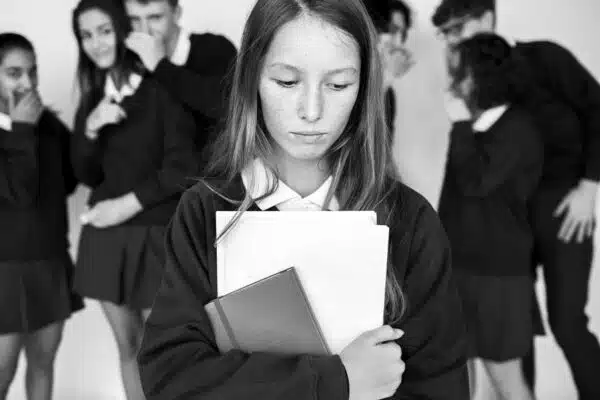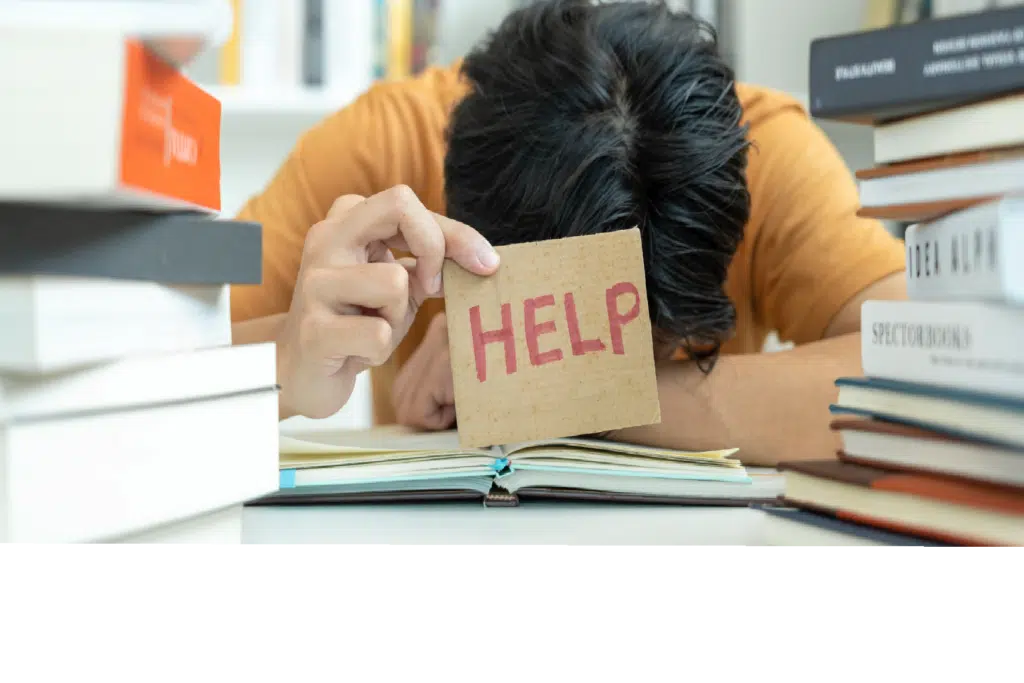THE BULLYING PARADOX
Empowering students & staff to take a stand against bullying in Australian schools

As you walk down the hallways of your school, enveloped by a myriad of distinct faces, it becomes evident that each individual possesses a unique story, personality, and inherent value. However, beneath this surface, a concealed weight rests upon their shoulders. I refer to this concealed weight as — monkeys. These monkeys represent a diverse array of factors that not only hinder mental wellbeing and impede human potential but also contribute to the occurrence of bullying.
It’s the monkeys on people’s backs that create torment and darkness.
It’s the monkeys on people’s backs that give birth to bullies, feeding unkind behaviour.
It’s the monkeys on people’s backs that create bystanders, resulting in inaction.
It’s the monkeys that create victims, leaving them feeling inadequate and powerless.
Without doubt, bullying affects every single person within a school community, not just the bullied, but also, the bully and the bystanders, as well as staff and parents.
Just to be clear, bullying is an ongoing and deliberate misuse of power in relationships through repeated verbal, physical and/or social and online behavior that intends to cause physical, social and/or psychological harm (Bullying No Way). It isn’t a one-time event; it’s a destructive pattern that erodes self-esteem and wellbeing.
According to Health Direct, bullying can have an impact on your mental health at any age. In children, it can cause loneliness, anxiety, and sadness. People who are bullied at work are more likely to suffer from depression and thoughts of committing suicide.
The reality is stark. One in four Year 4 to Year 9 Australian students report being bullied every few weeks. And that’s just the reported cases. The unreported ones? They’re the unseen bruises, the silent cries, the inward turmoil.
But I’m not here to paint a picture of despair, but rather empowerment, resilience and change, because change is possible.
Bullying in Australian schools presents a paradoxical challenge. It embodies negativity and harm, yet it holds the potential to teach us profound lessons in strength, empathy, and unity. The Bullying Paradox represents an opportunity to transform this problem into a catalyst for positive change—a chance to rise up, empower ourselves, and uplift one another.
So, what can students and educators do to flip the Bullying Paradox and shift the focus from despair to empowerment, from division to unity, and from negativity to positivity.
1) EMPOWERMENT THROUGH KNOWLEDGE, COMMUNICATION & CULTURE
(Kofi Annan)
Knowledge is a powerful tool, but its true value emerges when it is practically applied in relevant contexts. Through my conversations with school leaders and pastoral care coordinators over the years, it has become evident that the misuse of the term “bullying” is a common issue in school communities, leading to misunderstandings and incorrect identification of behaviors. To effectively combat bullying, it is crucial to equip students and staff with the right knowledge and tools.
This begins with a clear understanding of what actually constitutes bullying and what does not. Practical case studies can serve as valuable illustrations of different scenarios, helping individuals differentiate between bullying behavior, isolated unkind acts, and banter-related behaviors. By establishing this clarity, students gain the skills to recognize and report incidents, while staff and parents become better equipped to address the issue.
Moreover, fostering a supportive school culture sets the stage for resilience and empathy to flourish. When students feel safe and valued, they are less inclined to engage in bullying and more likely to intervene when witnessing it. This culture of kindness, understanding, and unity should extend beyond the classroom to encompass the entire school community, including playgrounds, staff rooms, and online spaces. Staff members must lead by example and consistently enforce anti-bullying policies.
By emphasizing the practical application of knowledge and ensuring its relevance in real-life situations, individuals are empowered to take meaningful action against bullying, paving the way for safer and more inclusive school environments.
“Kindness is a language which the deaf ear can see and the blind can hear?”
(Mark Twain)
Here are a few more practical suggestions to empower through knowledge, communication and culture:
- Conduct regular workshops and guest speaker sessions on various forms of bullying, its impact, and prevention methods.
- Encourage collaborative projects, peer mentoring initiatives, and buddy systems to foster teamwork, respect, and diversity appreciation.
- Set aside a weekly self-reflection session where you journal about your achievements, challenges, and lessons learned, helping you gain self-awareness and drive personal development.
- Organize school-wide kindness challenges to reinforce positive behavior.
2) MAXIMISING THE ROLE OF BYSTANDERS
In the Bullying Paradox, bystanders hold a unique power. They can choose to be a passive observer, or can take a stand and become an “upstander”, or what I call, a “braveheart”. A braveheart defends the victim, reports the incident, and refuses to join in the bullying.
I’ll never forget the day I received a heartfelt message on LinkedIn from a former school peer. It was a flood of emotions as I read his words, realizing that he still carried the weight of the bullying I endured all those years ago. He had just discovered my book, “Get the Monkeys off Your Back” and took the time to congratulate me on the release. But his message went beyond that. He expressed deep regret for not standing up against the bullying during school, admitting that he was part of the problem and not the solution to my struggles. His apology resonated with me, touching a chord I hadn’t expected after all these years.
It was a surreal moment, knowing that someone had been impacted by the bullying they witnessed. This brave man’s decision to reach out and share his honest feelings after 17 years was a powerful reminder of the lasting effects of bullying, not only on the victims but also on the bystanders. His words brought to light the pain and missed opportunities for support that I had experienced during those difficult times.
This personal story serves as a poignant reminder of the importance of addressing bullying and its impact on all those involved. It underscores the need for empathy, understanding, and action, so that no one has to carry the weight of regret and the burden of silence for years to come.
According to the Australian Human Rights Commission, if bystanders are confident to take safe and effective action to support victims then there is a greater possibility that bullying can stop and the person who is bullied can recover.
(Nelson Mandela)
Standing up can be challenging, but it’s also incredibly empowering. There’s strength in numbers. One upstander can inspire others, creating a ripple effect of courage and compassion.
Here are a few suggestions to positively maximize the role of bystanders:
- Conduct workshops and awareness campaigns: Educate students on the role of bystanders and provide practical strategies for safe intervention.
- Foster a culture of support: Encourage students to stand up against bullying collectively and promote empathy and kindness.
- Teach effective bystander strategies: Empower students with assertive language, seeking help, and providing support to victims.
- Encourage reporting and action: Stress the importance of reporting incidents and taking immediate action when witnessing bullying.
- Celebrate positive bystander behavior: Recognize and reward students who intervene or support victims, reinforcing the impact of positive actions.
- Create an active student leadership initiative aimed at implementing the above.
3) FOSTERING RESILIENCE THROUGH PERSONAL STORIES & HELP SEEKING
“There is no greater agony than bearing an untold story inside you.”
(Maya Angelou)
Personal stories of bullying and resilience have a profound impact. These narratives foster empathy, reduce stigma, and inspire action.
I embody the Bullying Paradox, having personally endured the pain of being bullied throughout my formative years in primary and high school. But I refused to let those experiences define me. Instead, I transformed my journey into a powerful force for good, empowering others and striving to eradicate bullying from school communities.
My own struggles became the fuel that ignited a passion within me to make a difference. I channeled my pain into a positive purpose, determined to lend a helping hand to those who face similar challenges. Through my story and actions, I aim to inspire, uplift, and provide support to those affected by bullying.
By understanding that others have faced similar challenges and triumphed, individuals realize they are not alone and can draw strength from collective resilience.
Here are a few suggestions to harness the power of resilience and personal stories:
- Organise events or assemblies where both students, staff and guest speakers can share their personal stories of resilience, especially in the context of bullying, emphasizing the lessons learned and the importance of support and unity.
- Creating a platform, such as a dedicated blog or newsletter, where students can anonymously share their stories and offer advice to others, further promotes empathy and connection.
- Encourage activities that promote the practicing of self care and self-compassion
- Run workshops or extracurricular activities focused on developing resilience, emotional intelligence, and self-esteem.
“Ask for help, not because you are weak, but because you want to remain strong”
(Les Brown)
Alongside the power of storytelling, the act of seeking help plays a crucial role in building resilience. Recognizing the importance of accessing available resources is crucial in this fight. Organizations like Bullying. No Way! and the National Centre Against Bullying provide valuable tools and resources for schools, parents, and students. They offer guidance and support in navigating the challenges of bullying. Additionally, school counselors, teachers, and trusted adults play a significant role in providing additional assistance.
To maximize help seeking and resource utilization, consider the following suggestions:
- Establish a dedicated section on the school website or notice boards that prominently feature information about local anti-bullying organizations, helplines, and counseling services. This ensures that students, parents, and staff are aware of the available support networks.
- Conduct regular sessions with school counselors to create a safe and confidential space where students can openly seek guidance and support. These sessions foster a sense of trust and encourage individuals to reach out when they need assistance.
By promoting help seeking and utilizing the resources at hand, we empower individuals to navigate the challenges of bullying with resilience and confidence.
To conclude, the Bullying Paradox is a formidable challenge, but united, students and educators possess the strength to triumph. By redefining bullying and amplifying empathy, resilience, and unity, we create a safe and compassionate school environment. Understanding the root causes, empowering victims, awakening bystanders, cultivating empathy, and seeking help are the keys to silence the monkeys that perpetuate this cycle.
Each school holds the power to rewrite their story, fostering empowerment and unity. Through acts of kindness, support, and standing against bullying, a profound difference can be made. Embrace the challenge, flip the Bullying Paradox, and build a future where positivity triumphs over negativity.
I’ll finish off with a favourite saying:
“The future depends on what we do in the present”
(Mahatma Gandhi)
My hope is that you embrace the challenge, flip the Bullying Paradox, and build a future where positivity triumphs over negativity. Our future depends on it.
For short inspiring videos, follow me on Instagram or Tiktok, or connect with me on LinkedIn.











